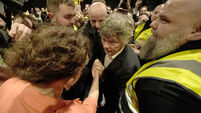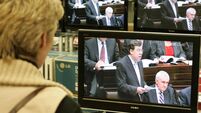Paul Hosford: why childcare is the new political battleground

At his party's think-in in Tullamore this week, Taoiseach Simon Harris made a bold announcement about Fine Gael's future plans for the sector, saying that a proposal which aims to create an affordable and accessible childcare model that will reduce the reliance on the private sector will be included in the next Fine Gael manifesto. Picture: Brian Lawless/PA
Health, housing, the cost of living.
Health, housing, the cost of living.
















